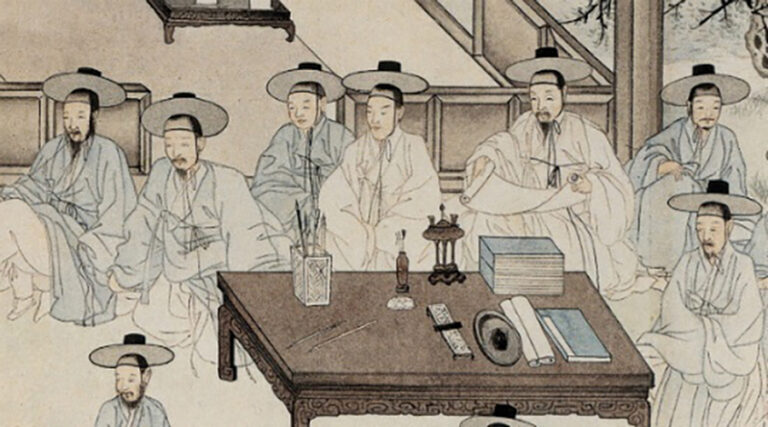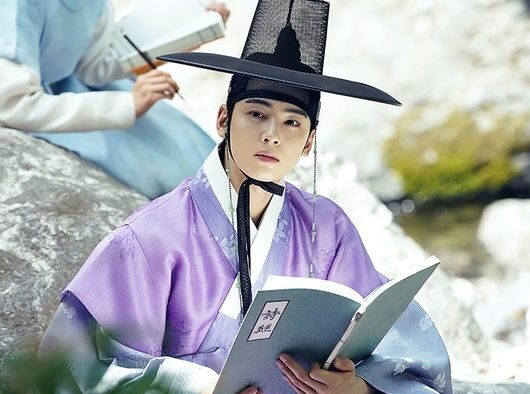Who Were the Seonbi?
Seonbi (선비) refers to a class of learned men in the Joseon Dynasty (1392–1897) who pursued virtue, justice, and scholarly knowledge over material wealth or status. Unlike aristocrats or bureaucrats motivated by power, Seonbi were characterized by their moral integrity, modest lifestyle, and dedication to Confucian ideals such as benevolence (仁), righteousness (義), propriety (禮), and wisdom (智).
“…not just scholars but moral leaders who practiced what they preached, emphasizing the unity of knowledge and action.” — Encyclopedia of Korean Culture

Origins and Historical Development
Early Traces
Firstly, the term “Seonbi” finds its origins as far back as the Three Kingdoms period, particularly in Goguryeo. Historical records describe court officials like Eul Pa-so as embodying early Seonbi values, advocating service during just governance and reclusion during corrupt regimes.
Flourishing in the Joseon Dynasty
With Neo-Confucianism becoming the state ideology, the Joseon government institutionalized the ideals of the Seonbi. Scholars from prestigious academies (seowon, 서원) and Confucian schools (hyanggyo, 향교) were expected to model righteousness. They actively participated in politics but often withdrew in protest against corruption—what is known as “loyal reclusion.”
Core Values
Moral Integrity
Seonbi rejected luxury and corruption. They wore humble clothes, lived simply, and did not seek wealth or rank unless it served the public good.
Social Responsibility
A true Seonbi did not isolate himself. They actively sought to correct social injustices, even at personal cost. Many were impeached or exiled for criticizing kings and powerful officials.
Intellectual Pursuit
They viewed study not just as an academic endeavor but a form of self-cultivation. Philosophy, history, and ethics were central to their learning.

Prominent Seonbi
- Yi Hwang (Toegye) and Yi I (Yulgok): Leading Confucian scholars whose writings shaped Korean ethical thought.
- Jeong Yak-yong (Dasan): Advocated for practical reforms, emphasizing public welfare over empty rituals.
- Pak Ji-won and Pak Je-ga: Criticized the formalism of traditional scholars and called for economic and political reforms.
“…not someone who memorizes Confucian texts, but one who breathes them into life.” — Jeong Yak-yong
Criticism and Reformation
In the late Joseon period, the Seonbi class became increasingly formalistic. Some neglected practical governance in favor of hollow ritualism. This gave rise to Silhak (실학) or the “Practical Learning” movement, which sought to combine ethics with empirical knowledge, such as agriculture, science, and economy.
Seonbi Spirit in Modern Korea
Centuries later, today, their ideal continues to influence Korean values:
- Education is still highly revered as a moral and social duty.
- Public figures are often held to ethical standards reflective of the virtues.
- Youth education programs sometimes include “Seonbi culture experiences” to teach humility, patriotism, and responsibility.
Modern Interpretations:
- “Integrity over profit”
- “Knowledge with action”
- “Humility in leadership”
Seonbi-style uniforms and etiquette are sometimes used in contemporary Korean ceremonies and ethics training.
Criticism and Reformation
In the late Joseon period, the Seonbi class became increasingly formalistic. Some neglected practical governance in favor of hollow ritualism. This, therefore, gave rise to Silhak (실학) or the “Practical Learning” movement, which sought to combine ethics with empirical knowledge, such as agriculture, science, and economy.
Korean Scholar-Gentleman
In conclusion, they were more than scholars—they were ethical compasses, cultural architects, and social critics. In an age of political turmoil and material excess, their legacy reminds us of the timeless power of honesty, education, and moral courage.
“They lived not for themselves, but for their nation, their people, and truth.”
References
Other Relevant Readings
Introduction & Hangeul >>
